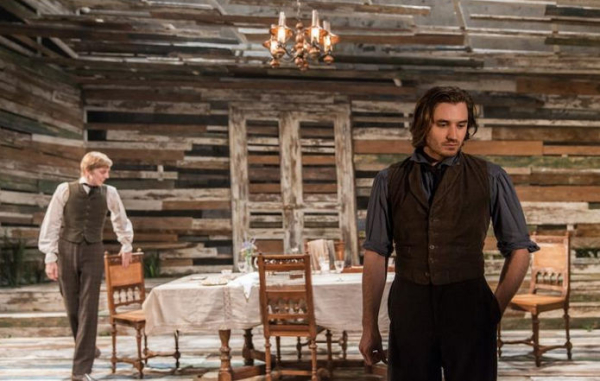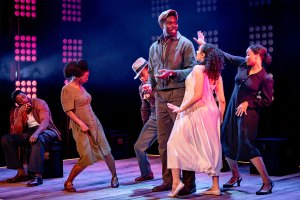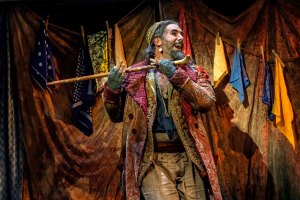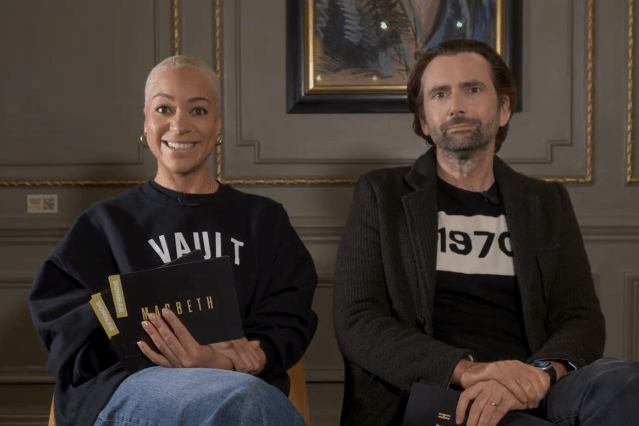Fathers and Sons (Donmar Warehouse)
Brian Friel’s 1987 Turgenev adaptation is revived by Lyndsey Turner

© Johan Persson
Brian Friel is in many ways the Irish Chekhov, and his artful, absorbing adaptation of Turgenev’s 1862 novel – more a transformation, really – has many Chekhovian features: a lovelorn servant, an effete guardsman, a duel at dawn, a revolutionary activist, stressed-out doctors, a country on the brink of upheaval.
Lyndsey Turner‘s spring-heeled, beautifully acted production creates a real sense of a new Chekhov play without losing Friel’s individual stamp, so that the play’s rhythm and melancholy seems entirely new-minted, more so than it did at the National Theatre in 1987 with a cast including Alec McCowen, Lesley Sharp, Ralph Fiennes and Richard Pasco.
Nikolai Kirsanov (Anthony Calf), a widowed estate owner, welcomes home his son, Arkady (Joshua James making something fresh and febrile of the Fiennes role), from the university in Petersburg with the news that he has provided him with a new baby half-brother, courtesy of the housemaid Fenichka (Caoilfhionn Dunne).
This thunderbolt is greeted with a sort of low level panic, and absorbed by Arkady’s friend, the impassioned ideologue Bazarov (a floppy-haired Seth Numrich) – "a bletherskite" is Friel’s term for him – as a sign of impending revolution, while his own suddenly developing interest in a beautiful neighbour, Anna Odintzov (Elaine Cassidy), leads to the dawn stand-off with Tim McMullan‘s disdainfully inflected, dandyish Pavel, Kirsanov’s brother and a retired guardsman now known as a "beau de cologne."
Friel compresses and alters great swathes of the novel and invents social scenes – and, of course, dialogue – that do not exist in Turgenev. But Arkady and Bazarov do visit the latter’s home, too, where Bazarov’s father, Vassily (Karl Johnson), a retired army doctor, and his open-hearted mother Arina (Lindy Whiteford) are facing hardship and another typhus epidemic in the community.
While nothing seems to happen on the surface, there are emotional convulsions all around, registered in different ways by Siobhan McSweeney’s servant Dunyasha, Susan Engel’s dottily imperious old aunt, the Princess Olga – "I detest every month; for different reasons" – and even David Fielder’s brace of old retainers, a dyspeptic bossy-boots in Nikolai’s place and a stooping, hairy-faced leftover in Vassily’s.
That contrast is echoed in Rob Howell‘s beautiful design of bare horizontal boards and planks on an angled perspective which create, with James Farncombe’s exquisite lighting, a sense of open countryside and then contract for Bazarov’s glorified shed of a home further out in the province.
In the tragi-comic shake-out, an increasingly distraught Arkady pairs off with Anna’s timorous younger sister, Katya (Phoebe Sparrow), while the music of the play goes from an obbligato of a Beethoven cello romance to a nerve-shredding "Te Deum" lamentation and the surprise finale of Ben Jonson’s "Drink to me only with thine eyes," misattributed to Shakespeare in a lovely, ironic joke by Friel playing on an audience’s inevitable confusion between Chekhov and Turgenev in his own subtle, supple appropriation.












